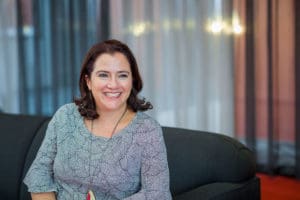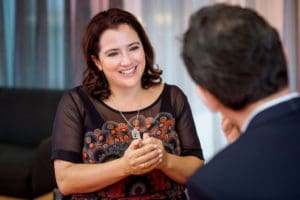Transforming Conflicts by Shifting Perspectives. Member Spotlight: Zandy Fell
Often, we are inclined to consider conflict as an abnormal occurrence, as a bad thing that suddenly disrupts our lives. However, “conflict is more normal that what people tend to believe,” says Zandy Fell. As a passionate expert in employment mediation, she adds that we are already pretty good at managing conflicts: problem-solving is a fundamental part of the evolution process. Zandy carries more than 15 years of experience in the mediation field and she is keen to underline that conflict must not be seen negatively per se, but that it can reach a certain threshold where our biologic conflict resolution skills are unable to cope with. It is at this point that a mediator can intervene to help the conflicting parties ‘shifting’ their perspectives to the point they do not clash anymore, rather they co-exist. Since the foundation in 2010 of her own firm, Zandy has facilitated hundreds of workplace disputes by mixing mediation, coaching, and restorative justice practices to support the contenders in the transformation of their ongoing conflicts.
“Compromise is essential”
 At the moment of introducing her educational itinerary, Zandy explains that while she was earning her bachelor’s degree in Law, she developed a strong passion for conflict resolution. She preferred it to argue and defending cases, as it happens in law cases, wherein the end one of the parties would have won, while the other would have lost. “I started believing that there could be better ways out of conflicts” she recognizes “where both parties win something”. The enthusiasm for alternative dispute resolution processes did not fade during the several years in Industrial Relations at the Toyota Motor Corporation. Rather, these years spent in close contact with a dynamic working environment reinforced her convictions about how disruptively impactful conflicts in the workplace are on business performance. “Throughout those years in the car manufacturing sector I could realize that the quicker you are able to resolve work-related conflicts, the more positive the impact will be on the overall organization”, she convincingly says.
At the moment of introducing her educational itinerary, Zandy explains that while she was earning her bachelor’s degree in Law, she developed a strong passion for conflict resolution. She preferred it to argue and defending cases, as it happens in law cases, wherein the end one of the parties would have won, while the other would have lost. “I started believing that there could be better ways out of conflicts” she recognizes “where both parties win something”. The enthusiasm for alternative dispute resolution processes did not fade during the several years in Industrial Relations at the Toyota Motor Corporation. Rather, these years spent in close contact with a dynamic working environment reinforced her convictions about how disruptively impactful conflicts in the workplace are on business performance. “Throughout those years in the car manufacturing sector I could realize that the quicker you are able to resolve work-related conflicts, the more positive the impact will be on the overall organization”, she convincingly says.
In 2010, both her professional and family aspirations led her and her husband Tony Fell, an experienced mediator as well, to found their own firm focused on mediation. The ZALT Group makes use of all-encompassing expertise around work-related issues, resorting to both employment law and social phycology insights, to develop practical solutions and help companies resolving workplace disputes. Besides, the Group organizes trainings and workshops to build conflict-resolution capacities within the working environment.
“Wherever there are people working together, there will be tension”
Since the foundation of The ZALT Group, Zandy has dealt with the whole spectrum of employment-related issues, working with both multinational companies, small businesses, and non-profit organizations. Despite the distinct working environments, the emergence of frictions between people working together, regardless of their ranks and positions, is inevitable. Some of these can be easily managed and dealt with autonomously. Zandy demonstrates strong confidence in human beings’ capacity to solve issues among each other’s. Other tensions, however, remain latent to the point they burst into an open dispute. It is time for conflict resolution to take action. When a mediator intervenes, flexibility cannot be overlooked. The method followed by Zandy follows a “fit-for-purpose” pathway, namely the initial phase of diagnosis is fundamental to tailor the mediation intervention in order to be as effective as possible. At this point, “the most important thing is to build trust in the parties and to apply a deep understanding effort to the act of listening, in a way that allows us to really grasp the roots of the conflicts”, Zandy recognizes. Similarly to medicine, the prescription of the appropriate remedy can solely stem from a correct diagnosis. This is why this beginning phase is so crucial within the overall process of mediation.
“Dialogue is the key”
 According to Zandy, notwithstanding the contingencies of each and different conflict, the key for an effective mediation relies on the capacity to create genuine channels of communication among the parties. Dialogue has a different nature as compared to finding an agreement, which is not always fundamental. “People do not have to agree on everything, it is normal to have different stances and interests that need to be balanced. However, mediation is about people listening to each other, only through this process, the conflicting views can genuinely understand each other’s perspectives”. All in all, mediation keeps at its core the capacity to enhance self-reflection in order to shift prejudices, stereotypes, and perspectives towards their co-existence, rather than a continuous clash. In this segment of the dispute resolution process, Zandy recognizes the essential role played by mediators’ capacity to ask questions “differently”, in a way able to inspire to a deep and self-analytical reflection. Conflicting perspectives can be reconciled only through authentic dialogue.
According to Zandy, notwithstanding the contingencies of each and different conflict, the key for an effective mediation relies on the capacity to create genuine channels of communication among the parties. Dialogue has a different nature as compared to finding an agreement, which is not always fundamental. “People do not have to agree on everything, it is normal to have different stances and interests that need to be balanced. However, mediation is about people listening to each other, only through this process, the conflicting views can genuinely understand each other’s perspectives”. All in all, mediation keeps at its core the capacity to enhance self-reflection in order to shift prejudices, stereotypes, and perspectives towards their co-existence, rather than a continuous clash. In this segment of the dispute resolution process, Zandy recognizes the essential role played by mediators’ capacity to ask questions “differently”, in a way able to inspire to a deep and self-analytical reflection. Conflicting perspectives can be reconciled only through authentic dialogue.
When asked where the causes of conflict stand, Zandy asserts that people’s egos play a significant role in obstructing a swift resolution of conflicts. However, in other cases, a whole range of factors results more decisive. History, background, personal stories, narratives are all elements affecting the way people deal with conflict, in the workplace as well as elsewhere. However, “humans are hardwired in continuous improvement and from here it stems the capacity to overcome conflicts for the benefit of our common improvement”.
“The stronger the leverage, the bigger the impact”
When it comes to her interest in the work of MBBI, Zandy is very enthusiastic about the philosophy and practical commitment of the organization. Besides, she is profoundly amazed by the warmth and welcoming spirit of the community that she joined four years ago. She recognizes the incredible strength of a worldwide network of mediators willing to join their efforts and skills in order to have a real impact where most needed. “I like the idea of using my skills to help others, especially the least privileged and I believe MBBI gives the opportunity to mediators from all over the globe to form connections and strengthen their reciprocal confidence in doing so – only good things can come from that”.
Zandy makes also part of the Australian group of MBBI, which in the last year increased exponentially its activities and the number of discussions in order to acquire a more definite structure. Zandy and the other Australian mediators are currently working on structuring an Australia Chapter, able to boost the impact of MBBI in the region. “It is true that in Australia we do not have wide conflicts, but our commitment wants to enhance the capacity and skills to solve the conflict at all levels of the Australian society”, Zandy acknowledges.
In Australia and elsewhere, people own by nature the mindset for resolving problems, of this Zandy is convinced. However, “we have a mindset, but we are not provided with the appropriate tools. If I could gift the next generations with something, this would be the ability to self-reflect, to truly listen, and the ability to truly articulate what you keep at your heart”. According to her, this would represent an invaluable endowment towards future generations on the way toward a more “peace-able” world.
Written by Matteo Piovacari: MBBI Writer
